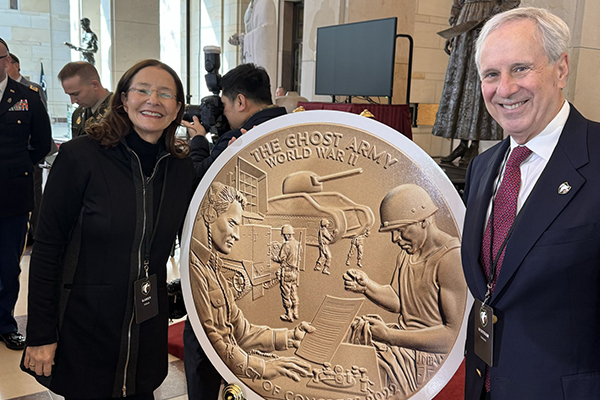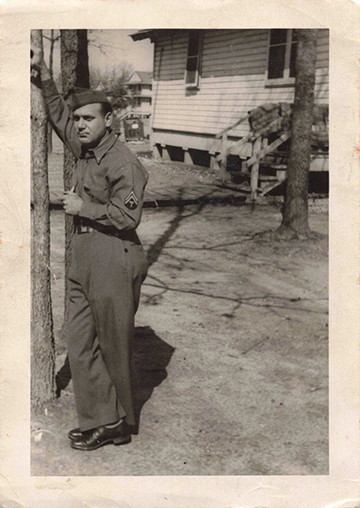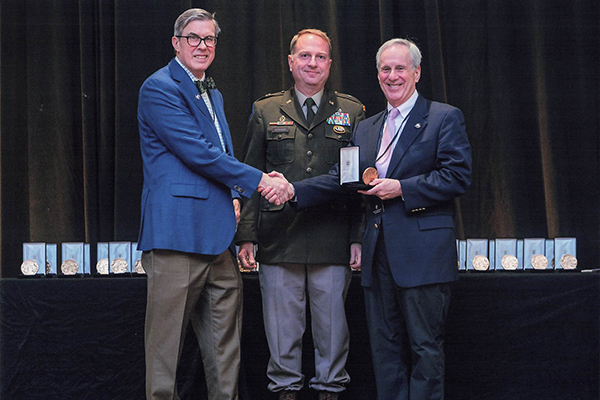
11/03/2025
Editor’s Note: This story was published in the Fall 2024 edition of the Columns alumni magazine and is being rerun in honor of Veterans Day. The university’s 2025 Veterans Day ceremony will take place Tuesday, Nov. 11, at 3 p.m. in Old Main Brown Auditorium.
Seeing a ghost, traditionally, is cause for alarm or an exorcism. For Distinguished Alum Bert Edelstein ’74, Ph.D., it was a chance to embrace a hidden, heroic chapter of his father’s life.
Decades after Philip Edelstein passed away, Bert discovered that his father was secretly part of World War II’s Ghost Army, a vital counter-intelligence wing of the allied military.
“I was startled by it and somewhat in disbelief,” Bert said.
This classified group, officially known as the 23rd Headquarters Special Troops, developed and used new techniques in tactical deception critical to re-taking Europe from Nazi Germany.

Philip was part of the Ghost Army’s signal corps, sending false morse code and radio messages to hide troop movements. Bert noted that they would come under fire from enemy forces tricked to think these Ghost Army soldiers were, in fact, battalions of tanks and infantry.
“When I think about my father doing this it doesn’t fit with my picture of this very kind, gentle, loving guy,” Bert said. “Exposing himself at age 26 through these incredible dangers.”
The work of the 82 officers and 1,023 enlisted soldiers was classified until 1996. Philip passed away in 1965, never having broken his promise of secrecy to anyone.
Luckily, he kept his discharge papers after the war. Bert shared them with his cousin, librarian Bonnie Orlin, whose search found a roster of Ghost Army soldiers with Philip’s name on it.
Bert then learned more from Rick Byer, director of a documentary called “The Ghost Army” that debuted on PBS in 2013. Byer supplied photos from the war to Bert. Searching through them, he found several with his father — the first direct visual link in his family to the life that none of them but Philip knew.
As the mystery unraveled, Bert’s determination to finally honor Philip and the rest of the de-classified Ghost Army grew. He and other Ghost Army families campaigned to honor the soldiers with the Congressional Gold Medal, Congress’ highest honor of achievement.
After six years of emails, letters, hope and tireless work they won over the required majority in the House and Senate.
“I was exhilarated,” he said.
The owner of The Edelstein Group, an executive development consulting firm, Bert’s determination to honor the Ghost Army is just the latest example of the drive that's been a part of him since he was younger.

As a student at Cortland, he was a member of the National Student Lobby — now part of the United States Student Association — and was also the school’s radio station manager. He began the push to get an FM radio license and took the issue to officials like then-school president Richard Jones.
“I thought that an FM radio station could change Cortland by bringing a different source of information, educational programming and music to the Cortland area,” Bert noted.
That license for WSUC-FM was obtained after he graduated, in part through the work of his friend, Michael Flaster ’78.
“I guess I’ve always felt like I wanted to make a difference and have an impact,” Bert said. “And not mind having to run through a few walls to get there.”
After final approval in 2022 by Congress, the last surviving soldiers of the Ghost Army joined Bert and others this spring in Emancipation Hall in the U.S. Capitol Building for a tribute 80 years in the making.
The event saw generals, the chairman of the Joint Chiefs of Staff and other high-ranking public figures etch into history a group of men who’d almost been left behind — as shadowy and elusive as their namesake during the world’s most destructive war.
For Bert, it’s a reminder of the ideals that Philip and others defended far from home.
“I think the more people understand what we fought for in World War II and how the country came together to fight a terrible threat to democracy and to peace — the better.”